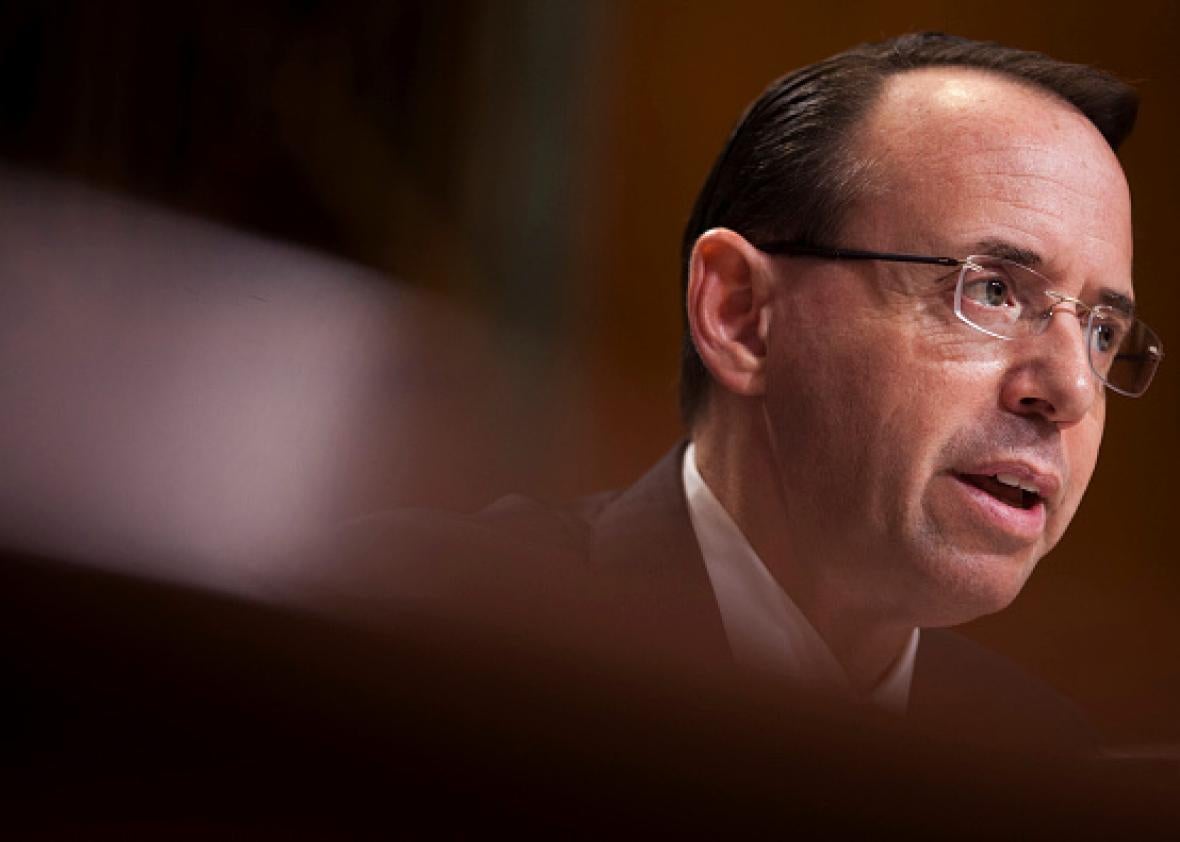If President Donald Trump decides to terminate special counsel Robert Mueller, then it’s going to get very ugly very quickly. That was the upshot of Deputy Attorney General Rod Rosenstein’s testimony before a Senate Appropriations subcommittee on Tuesday.
Rosenstein said that he is the only one currently charged with possibly firing Mueller and that he does not see the required “good cause” to do so. This testimony came just one day after a confidant of Trump floated that the president was “considering, perhaps terminating the special counsel.”
Last week, Trump said at a news conference that he’d “100 percent” be willing to offer testimony to Mueller that fired FBI Director James Comey was lying under oath when he described Trump as seeking to influence the Russia investigation and drop a portion of it. Mueller now leads that investigation into Russian attempts to influence the 2016 election, whether Trump campaign officials may have colluded in those attempts, and any crimes possibly stemming from that case.
During the hearing, ostensibly about the Justice Department’s budget priorities, senators from both sides of the aisle repeatedly peppered Rosenstein with questions about whether he would agree to Mueller’s firing under the current circumstances. The resounding answer was no, and the implication is that if Trump ultimately decides to fire Mueller, then Rosenstein will have to go first.
Under questioning from Democratic Sen. Dianne Feinstein of California, Rosenstein testified that currently he would have to assent to Mueller’s firing because of Attorney General Jeff Sessions’ recusal from investigations involving the 2016 campaign and that he would not currently do so because he did not see the good cause that is required by the special counsel law.
“I appointed him,” Rosenstein said. “I stand by that appointment. I think it was the right thing to do under the circumstances and I’m going to defend the integrity of that investigation.”
Earlier in the hearing, Republican Sen. Lindsey Graham of South Carolina tried to clarify where that line for “good cause” was. Specifically, he mentioned a line of argument brought up by Trump ally Newt Gingrich, among others, that Mueller’s hiring of investigators who had donated to Democrats might be reason to mistrust the investigation.
Graham: Is giving political donations a reason to disqualify somebody for serving in the special counsel’s office.
Rosenstein: No, senator, it is not a disqualification. It is not.
Graham: As a matter of fact, in many states, the judges and prosecutors are actually elected. Donations are part of that system, is that true?
Rosenstein: Yes, that’s true.
Rosenstein also told Graham that “as long as I’m in this position, senator, it would be my responsibility to make that decision” to fire Mueller. “Well, I’m glad you’re in this position,” Graham responded.
Democratic Sen. Joe Manchin of West Virginia raised the possibility that Rosenstein might himself be fired without cause. In that circumstance, a replacement would be appointed by Sessions. “Anything’s possible,” the deputy attorney general responded.
Democratic Sen. Chris Van Hollen of Maryland, meanwhile, asked Rosenstein whether a direct order from President Trump would constitute “good cause” to fire Mueller.
“It doesn’t matter who the order comes from, good cause would be based on the reasons for the proposed removal,” he said.
Under questioning from Van Hollen, Rosenstein also testified that removing the special counsel in order to prevent the investigation—as Trump himself implied he did in the firing of Comey—would also not constitute good cause.
“As long as I’m in this position, he’s not going to be fired without good cause,” Rosenstein said. “If he were, it wouldn’t be my responsibility.”
Sessions was initially supposed to testify before the appropriations subcommittee, but requested to send Rosenstein in his place. The attorney general was scheduled to testify later on Tuesday before the Senate Intelligence Committee, which is also investigating Russian interference in the 2016 election.
It was unclear if there would be any serious consequences from Republican senators were Trump to fire Rosenstein and anyone else who might refuse an order to remove the special counsel. However, the fact that Graham and other Republicans asked these questions indicates at the very least there would be the spectacle of further blockbuster public hearings along the lines of last week’s Comey testimony were such an event to occur.
